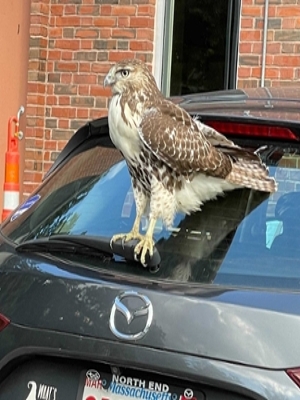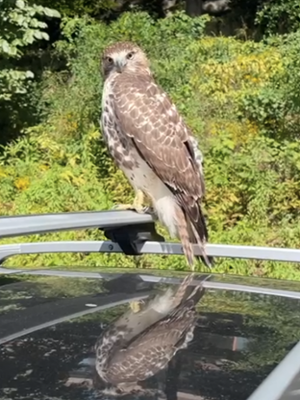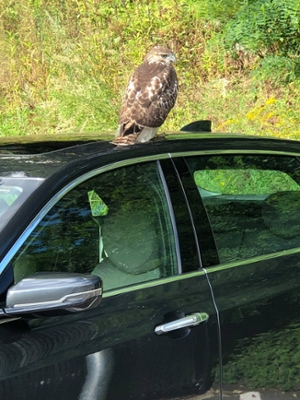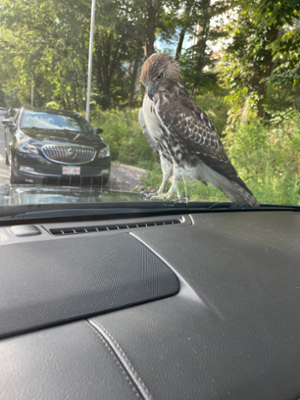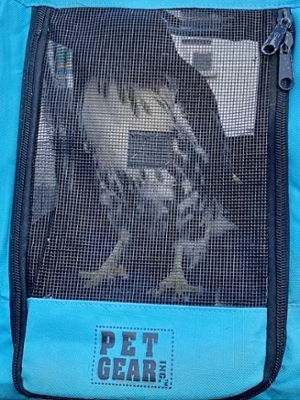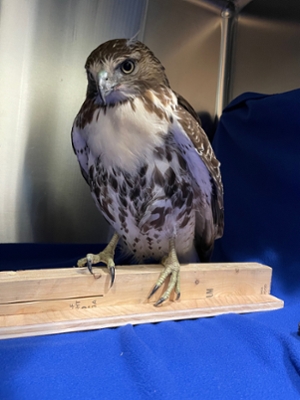Story of a Brandeisian Hawk: An Unexpected Rescue
By Christine Jacinto
Oct. 4, 2021
In late September, staff from ITS and the Library had the unique and rare experience with a red-tailed hawk, not as it glided overhead, but up close as the raptor took up residence on different vehicles. Despite being perched atop of a slow-moving vehicle or hearing a car horn, the bird continued to keep the company of fellow Brandeisians — perhaps as a way to signal for help — given that's what we do best. With concern for the hawk's well-being and safety, staff were quick to research how best to help their feathered friend. Learn more about the unexpected rescue with a virtual interview with Carroll Hardin, Senior Desktop Systems Specialist with the Technology Help Desk in ITS.
When and where on campus did you see the hawk? Have you seen the hawk before around campus?
I didn't come onto the scene, so to speak, until the tail end of this saga and only saw the red-tailed hawk on my way home from work on Wednesday, Sept. 22. I noticed it sitting surprisingly quietly on the ground with a concerned huddle of library staff talking nearby.
I believe that it was the day before that my ITS and library colleagues noticed the hawk camping out on their cars or sitting on the ground, and everyone excitedly took pictures and videos since none of us usually has the opportunity to see such a large bird up close like that. The library staff mentioned having seen the hawk around campus, which is certainly possible, since I believe hawks tend to stay around their nesting territory.
How did you know what signs to look for with regards to behavior and how did you know what action to take?
When library staff noticed the hawk Tuesday, they were concerned and began researching reasons a hawk would be hanging around more quietly and for a longer period of time than one would expect. They also began talking with wildlife professionals and knowledgeable professors here at Brandeis. They certainly did most of the worrying and the lion's share of the legwork of trying to find a way to help!
When I saw the hawk late Wednesday, I could see that it wasn't externally injured and wondered if it was an all-too-common-now case of rodenticide poisoning that the hawk was suffering from. After talking with the library staff, it seemed clear the situation wasn't improving at all. In fact, it was deteriorating steadily. Since no one was coming to get the hawk, I volunteered to transport it to a wildlife medical professional.
As an animal lover, I'm always anxious that I might encounter an injured animal and have the proper tools for transporting it. So, for this exact reason, my husband and I have a collapsible pet carrier and a heavy-duty pair of leather welding gloves in the back of our car. I put the gloves on and gently picked up the hawk and put it into the carrier. The hawk gave no resistance to my approach or picking it up, which was yet another sign that something was seriously was wrong with it.
Are there any other details about your experience that you would like to share?
In Massachusetts, the Tufts Wildlife Clinic in North Grafton and the New England Wildlife Center in Weymouth are two well-known locations where injured wildlife can be taken. But both facilities were closed for the day. Angell Memorial Animal Hospital in Jamaica Plain is unable to treat wildlife, but they will take in wildlife and triage them. If appropriate, they arrange with volunteers for transport to a wildlife specialist. Due to conflicting information, I began searching for another location to take the hawk. Since it was late in the day, I was anxious that I'd have to keep the hawk on my back porch for the night and nervously hope that it would make it through till the next morning.
I started down the AnimalHelpNow app's list of rehabilitators or clinics that could take in raptors (more information below). The first place I called, Heal Veterinary Clinic in Watertown, still had a wildlife specialist in the office. So with great relief, my husband and I set off to Watertown with the hawk in the back of our car.
The Heal Veterinary Clinic quickly worked to give the hawk a look over, and after some subcutaneous fluid, some food and some medicine to help treat the suspected rodenticide- or lead poisoning, the hawk was in better shape. I called the next morning and someone from the clinic was on their way to the Tufts Wildlife Clinic with the bird.
I checked in a day or two later and was told that test results had shown that the hawk was suffering from West Nile virus, common in birds. Unfortunately, there's no bird vaccine for this currently available, and so the hawk had to be euthanized. All involved were sad to hear this but were relieved that the hawk wasn't left to suffer from the virus, dehydration or to be attacked by another animal.
Can you tell me more about the AnimalHelpNow app?
The AnimalHelpNow (AHNow) app is free and available for mobile devices. The app uses the phone's location services to determine where one is at the moment and provides advice on whom to call or where to go in cases of a wildlife emergency (or even just a wildlife conflict, for homeowners who might want to have someone help them rehome an ill-placed critter).
Is there anything else you would like to share with the community about our feathered (or furry) campus visitors?
I don't pretend to speak as a wildlife expert, but I know that it's never the first step any of us should take to wrangle a wild animal and spirit them off and away from their homes. In this particular case, after observation, research and with the right physical protections in place, it seemed safe to transport the hawk and the right course of action. I think all of us involved felt better knowing that we did something.
Especially in springtime, it's tempting to think of every young animal out in the open as possibly orphaned or injured and unwittingly cause them more harm by trying to do good. This is another good way that the AnimalHelpNow app can be of assistance, by putting one in touch with an expert who can give advice on what’s the best way to proceed. I've since learned that wildlife clinics don't usually have the space or staff to tend to orphaned animals, so it's valuable to know of wildlife rehabilitators around one who can assist.
Although the hawk's story did not end as everyone had hoped, the care and efforts put forth did not go unnoticed. Matthew Sheehy, university librarian, shared, "I was very sad the bird was sick, but grateful Carroll was able to help the hawk and give [her] the care and dignity [she] deserved."
Feathered Campus Visitor
Wildlife Resources
-
AnimalHelpNow - download the mobile app from Apple Store (iOS) or Google Play Store (Android)
